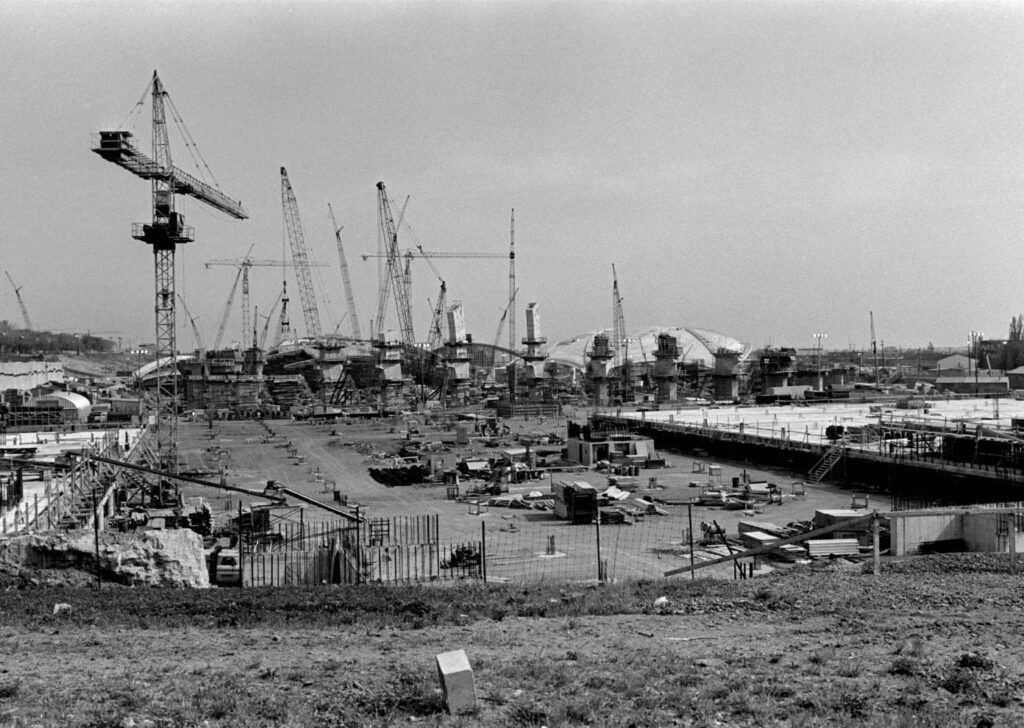Maxime Raymond Bock animates Morel with a time-tested literary premise: That even seemingly unremarkable human lives are worthy of examination. That such examination, when conducted with empathy, specificity, and a generosity of spirit, may yield truths about yearning, regret, and redemption — in other words, the big questions.
Published in French in 2021 and recently translated into English by Melissa Bull, the novel follows Jean-Claude Morel, a mid-century construction worker who bears witness to and participates in Montreal’s transformation from a soot-choked industrial centre to a cosmopolitan cultural capital. It unearths parts of a city lost to urban development — including the Faubourg à m’lasse neighbourhood, named for the smell of molasses from West Indies trading ships and demolished in the ’60s and ’70s — just as it evokes the many pains and joys of working-class life in the vanishing landscape.
Within the first ten pages, eighteen-year-old Morel attempts to rescue a childhood pal being beaten into a coma on the street. A perverse desire to stomp on his prostrate friend reminds him of a similar desire upon finding his dead father, Henri, years prior. Thoughts of that gruesome discovery send Morel back farther still, into an imaginative recollection of how Henri lost his arm in a conveyor belt while working at a linoleum factory. The rest of the novel caroms through other moments with the same relentless asynchronous digression. Memories touch off other memories, which gradually pile up like snow. Marriage, children, grief, divorce, the physical indignities of aging: Bock takes major life events and throws them in the air so that they land out of order. His biggest stylistic trick — and biggest success — is in holding various events up to each other, revealing how closely joy and pain can be intertwined. One chapter describes Morel’s summer wedding to his beloved, Lorraine. As the chapter ends, the bridal party leaves the church. The next one smash-cuts to the same church exit, now years later, at the funeral for the couple’s youngest daughter. The people and the place are much the same, but the difference is time.

Unearthing a working-class landscape lost to Place Ville Marie and other developments.
Fonds Ministère des Communications; BAnQ Québec
Within this torrent of memories, Morel the person emerges, mosaic-like. He is a character scarred by the petty cruelties and tragedies of a hardscrabble existence: a mock hanging for a boy accused of stealing a soapbox; a seventeen-year-old buried under a truckload of hot asphalt, accidentally disgorged, after which the truck driver burns “his hands to the bone trying to get the boy out.” The night after his father’s funeral, Morel receives a hammer from his uncle, and he begins a series of construction jobs. He labours on highways, on the La Fontaine Tunnel, on Place Ville Marie — projects of “the all-powerful modernity that tears everything down with the incoercible momentum that enthusiasts deem progress.” Morel must reckon with the fact that the work displaces and disperses his own community. His is the hand holding the hammer in the transformation of Montreal, to the point that it’s almost unrecognizable. Physical and emotional injuries accumulate, until he’s left with a “grey, perpetually broken and patched body, left piece by piece to the city.” Mystified at his familial estrangements, Morel reminds himself how tough he is and wonders what it all adds up to.
Morel is a love letter to the Montreal of the past, present, and future — to the Montreal that might have been, the Montreal forgotten. It’s a cliché to say that a city is a character in a novel, but to Bock, a city is like a life, with painful and joyful memories accumulating and disappearing like archeological material. So we find Morel, near the end of his life and the middle of the novel, alone in his smallest apartment yet, left to contemplate “the chasm around the scaffolding.” Catherine, a granddaughter he has never met, pays him a visit to learn about her roots. She rejects Morel’s insistence that his life was boring, and Morel considers “his memories, which only resurface out of order.” Here is also the closest Bock comes to acknowledging his project: “One tangle of unpredictable scenes followed haphazardly by another, as memories do, with dead ends, threadless plots, unresolved narratives.”
Writing in The New Yorker in 2015, the critic Pasha Malla compared Bock’s writing to that of Roberto Bolaño. Indeed, Morel shares the Chilean’s technique of searching for meaning in digression. This tendency is (perhaps intentionally) disorienting: for a book so concerned with the specificities of time and place, it can create confusion about when and where we actually are. The plot jumps from year to year, between chapters and sometimes between lines, without any attempt to situate the reader. At one point, Morel, in his old age, is blind drunk, mourning the loss of Monique, his firecracker second love, to cancer. But as he leaves the bar, he’s out drinking with his colleague Simatos at age twenty-six. The novel is full of threadless plots. It’s driven less by traditional narrative pleasures than by small events that gain significance only when viewed from the past and the future, by vignettes that must stand on their own — and mostly do.
Morel is best experienced in a sort of flow state, by a reader who welcomes disorientation as memories stack upon memories, in the hope that a character emerges who feels true. Like many good novels, it will leave you feeling as if you’ve lived a life.
Sam White is a researcher and copywriter in Toronto. He holds a master’s degree from the University of Toronto’s creative writing program.

